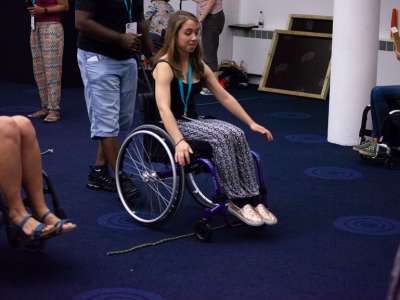
As part of the Posture and Mobility Group (PMG) annual conference programme in 2018, PMG offered a training event by the International Society of Wheelchair Professionals (ISWP). The ISWP have created a hybrid training course, based on the World Health Organization's 5-day basic wheelchair service training package. The training includes some online learning through both written material and videos, an online assessment and then the one-day practical training to consolidate and put into practice the information learnt online. There is also a follow up assessment after the training day which enables students to measure their learning and development.
The World Health Organization (WHO) reports that less than 5% of those in need have access to a properly fitted wheelchair, and that there are limited training opportunities to gain the skills to prescribe a wheelchair effectively (World Health Organization, 2012). The ISWP’s mission is for all people who need wheeled mobility devices to receive the appropriate products and service with dignity. As such, it is involved in professionalising wheelchair services around the world through training and coordinating services, amongst other things (ISWP, 2018).
It was a privilege to access training materials that were used worldwide; this was a unique aspect of the training which broadened the attendee’s clinical reasoning process and understanding of wheelchair provision. For example, the assessment scenarios involved a range of different environments which the student had to consider when selecting and providing justification for a particular wheelchair/seating prescription; had the training been only UK specific, the student may not have had the opportunity to consider these types of environments.
The combination of the online learning and the practical day was a fantastic way to consolidate learning, ask questions and clarify any uncertainties with experts in the field. The practical day involved measuring one another for wheelchairs, working through case study scenarios and learning wheelchair skills. The discussion initiated through the case studies further developed clinical reasoning and broadened perspectives, challenging attendees to really consider and justify the ‘why’ of what they would prescribe for a given individual.
The opportunity to develop wheelchair skills was provided by the Back Up Trust. Back Up delivers a range of services, not just the wheelchair skills training, to help return confidence and independence into the lives of people who have suffered a spinal cord injury (Back Up, 2018). Many of Back Up’s volunteers and staff have been affected by spinal cord injury, and therefore know the day to day reality of living with such an injury. Being trained by individuals who have a spinal cord injury, and hearing their stories, helped the attendees understand more fully how each of the skills being learnt is required daily, be that negotiating the wheelchair round a toy-filled house or ascending/descending curbs and steps. Experiencing the feel of different wheelchairs, learning how to control the chair in different ways and work out what technique is most appropriate for oneself, depending on the task, as well as developing more confidence in using the chair, were invaluable experiences. Photo is of Rebecca learning wheelchair skills at PMG Conference 2018
This training course was a rich and varied learning experience which I, as a newly qualified occupational therapist, have benefitted from in so many ways. I am more competent and confident in measuring for a wheelchair and justifying a prescription. And I now have an experiential understanding of what it's like to learn wheelchair skills. The course has not only developed my practice competence and confidence, benefitting the clients I work with, but it has also broadened my understanding of the worldwide need for properly fitted wheelchairs and training packages such as this.
References
World Health Organization, Khasnabis, C., and Mines, K. (2012). Wheelchair service training package: reference manual for participants : basic level. Geneva, World Health Organization (WHO)
The International Society of Wheelchair Professionals (ISWP). 2018. (online). Available at: http://www.wheelchairnet.org (Accessed: 23/10/2018).
Back Up. 2018. What we do (online). Available at: https://www.backuptrust.org.uk/about-us/what-we-do (Accessed: 23/10/2018).
PMG trainers: Susan Gold & Patience Mutiti
Back Up trainers: Hannah Hunt & Chris Yeates
Photography: Jonathan Rourke






.jpg)



no comments
Add your comment...